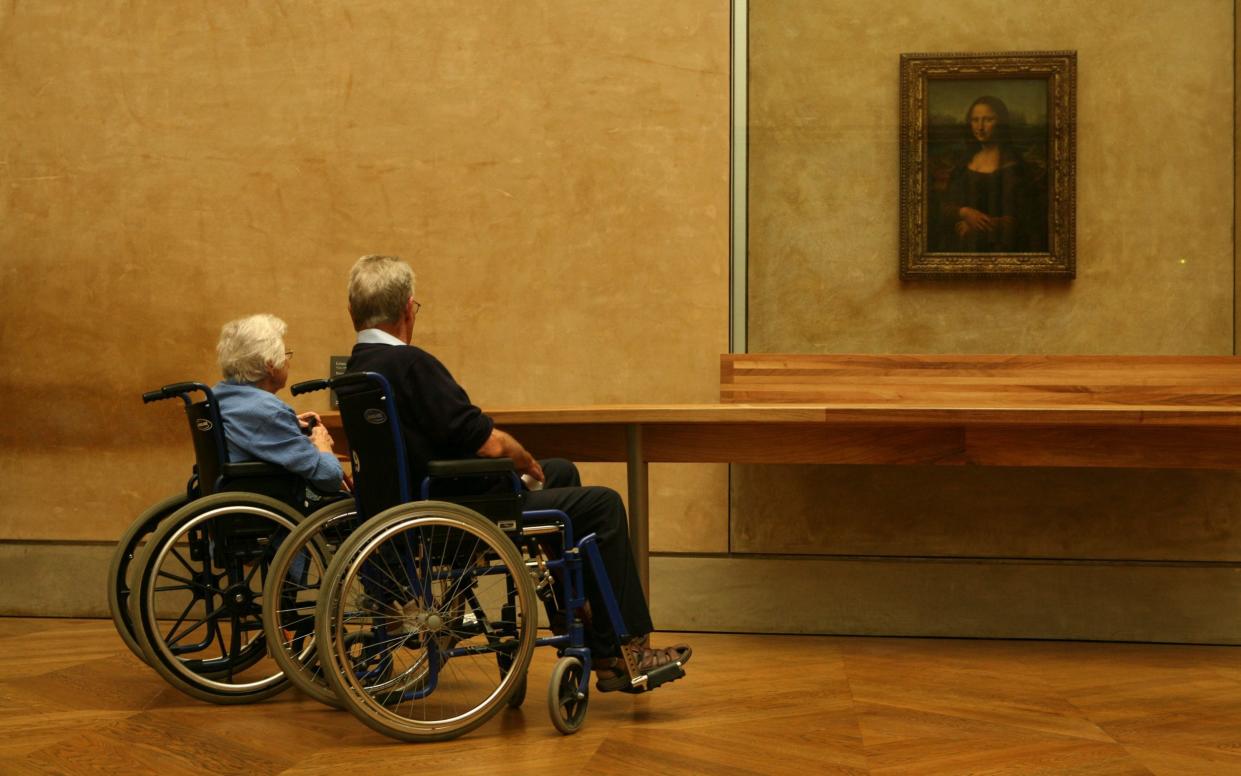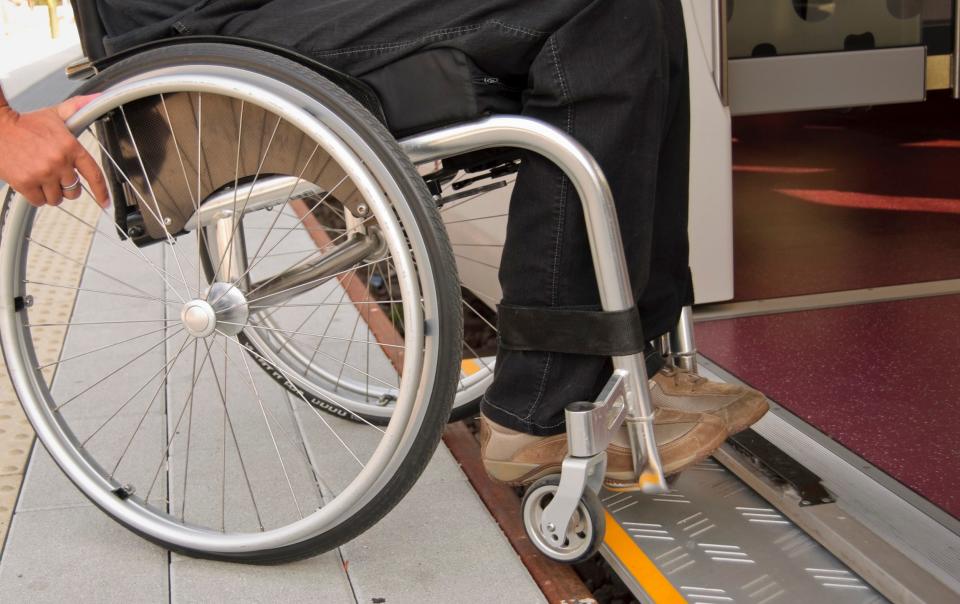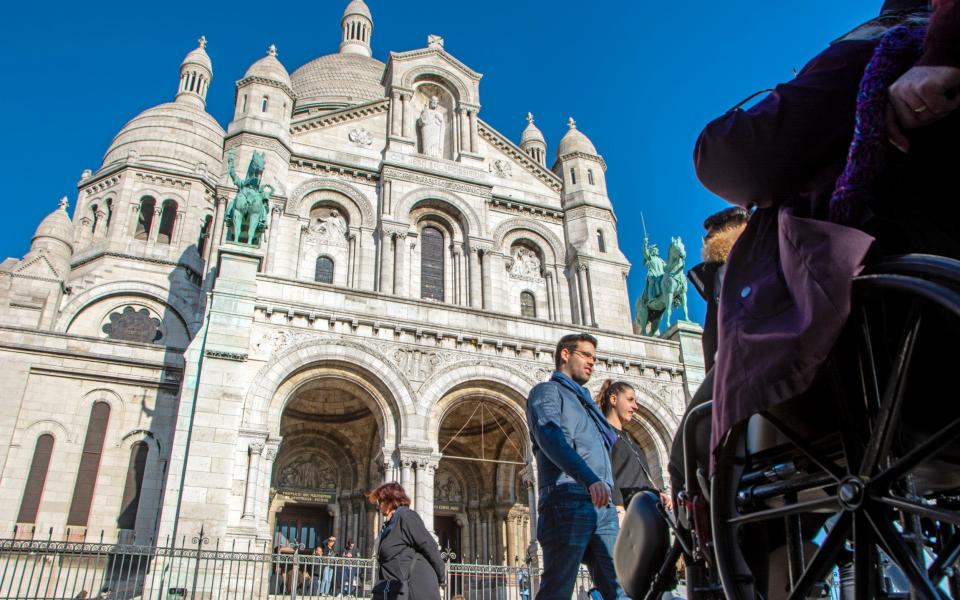How Paris is failing disabled visitors ahead of the Olympics and Paralympics

Many of the events at this summer’s Olympics and Paralympics in Paris will be held at existing monuments, including the Invalides complex on the Left Bank, which was built under the reign of Louis XIV as a place to house injured veterans – but also keep them separated from the rest of the population. The mentality the name represents ought to be a vestige of the past, yet as the Games draw closer, some claim that the city still has a way to go in its marathon for inclusivity.
When Paris bid for the Games in 2017, the city laid out its plan for a “sport-driven journey towards a society where no person is left behind”. The Games would be leveraged as an opportunity to improve the historically lacking accessibility credentials of the capital for disabled people.
Organisers are expecting around 350,000 disabled visitors to attend this summer and thanks in part to pop-up venues and temporary infrastructure such as shuttle buses, all the sites are reportedly accessible, at least in terms of physical infrastructure.

However, some campaigners are concerned about the legacy after the Games. Nicolas Mérille is national adviser on universal accessibility at prominent charity APF France Handicap [the word “handicapé” is still used in France to mean disabled]. “In preparation for the Olympic and Paralympic Games, there has been a concerted effort that should be recognised, but these measures are only going to last the duration of the Games,” he says.
Some 1,000 accessible taxis have been added to the city’s offering of 250, some of which are repurposed London cabs. A period of three years has seen renovations carried out on more than 1,750 bus stops, so that all but two of more than 60 routes that criss-cross Paris now have the possibility of step-free access. Buses themselves have ramps that the driver must deploy on demand.
However, Mérille still thinks that the French capital falls short when contrasted with London in 2012, citing the proportion of underground stations with step-free access in London – 18 per cent at the time of the London Olympics and around a third now – compared with the equivalent figure in Paris, which APF puts at just 3 per cent.
Christophe Decloux, head of Visit Paris Region, insists that accessibility for people with specific needs – including those who are pregnant, older, travelling with pushchairs etc, as well as disabled people – is a key priority. “Since 2016 we have made a lot of effort to make this destination more accessible and we have a team dedicated to accessibility,” he says.
The new driverless Line 14 on the Metro will link the site of the Olympic Village in the northern suburb of Saint-Denis to the city centre and is the only line to be fully accessible for people with reduced mobility. Across the broader network, Lines 1, 4 and 14 have audible announcements to assist people with visual impairments, while Lines 1,2, 3 and 13 show visually where the Metro is stopping for those with hearing impairments.

According to Decloux, the Metro is inherently limited owing to the density of Paris and the historic hollowed quarries under the city. “Everyone is working so that Paris is accessible for all – but today all the Metro stations that were modifiable have already been modified: it is not a lack of ambition or will.”
Annette Masson, president of the not-for-profit Tourisme et Handicap, which aims to help tourism professionals make their offerings accessible to all, describes a lack of awareness, and sometimes consideration, in the general population. “Bus stops are accessible but drivers park their cars in the bus stops,” she says.
There is already legislation in place that codifies accessibility in public sites. A first bill was passed in 1975 and followed up in 2002, then 2005, when the French state passed the bill “for the equal rights and opportunities, the participation and citizenship of disabled people”.
For many working in this space, the blocker is the gap between the word of the law and the practice of implementation. Masson suggests that there needs to be more education among the general population as well as more sanctions from the Government for when people do not respect the rules.
It is an assessment with which Nicolas Mérille agrees, going further to accuse the state of failing disabled people by not enforcing laws sufficiently. While all new buildings must conform to the regulations, there is significant leniency for existing structures. “The laws are still not being applied,” says Mérille, and adds: “We have laws but we let them die a slow death.”

When it comes to hotels and restaurants, Masson also perceives an education gap. “Often [hotel and restaurant owners] think only of adding the amenities, not the experience of using them. For example, perhaps they add a shower seat, but not in the right place,” she says.
In 2023, President Macron announced a fund of €300 million to finance accessible renovations for smaller businesses, with an initial priority given to areas welcoming Olympic events. But campaigners such as Mérille argue not enough has been done to advertise the opportunity.
Tourisme et Handicap also aims to raise awareness with tourism industry providers about the full spectrum of access needs, not just reduced mobility. The organisation partners with the French tourism authority Atout France and has developed a verification and certification system for hotels, restaurants and other attractions.
While accessibility for both locals and visitors in Paris may still have a way to go, there is reason for optimism (see below). In the Aquatics Centre in Saint-Denis, the only facility that has been entirely purpose-built for the Games, the accessibility credentials are reportedly excellent. The housing built for the Athletes’ Village nearby is also accessible and will become part of the local housing stock after the events. “We hope these Games will create an electroshock for French society,” says Mérille.
Essentials
For more information visit:
Accesslibre (Atout France; the French tourist board)
Visiting Paris with a disability (Paris tourist board)
Inclusivity and accessibility at the Games (Paris tourist board)
The Paralympic Games torch relay route
‘A little planning goes a long way’: What it’s like to visit Paris as a wheelchair user
By Lucy Webster

Paris, like all ancient European cities, is not necessarily the most accessible place you could think of for a holiday on wheels, or indeed to host the Paralympics. But in my experience, a little planning goes a long way and exploring the city is much easier than it might first appear. I’ve been to Paris several times, using both a manual and an electric wheelchair, and I’ve always managed to see, do and, most importantly, eat everything I wanted to.
As in other cities such as London and New York, the Metro is pretty much a no-go zone, except for the new, fully accessible Line 14. There are other accessible Metro stations on different lines, but I didn’t think it was worth the stress of navigating the system when I was only in town for a long weekend. One real frustration was how difficult it was, especially compared to London, to find an accessible taxi; they had to be booked ahead of time or face a long wait. So I was pleased to hear of the planned increase of 1,000 accessible taxis, wih just 250 available in 2022. It is a shame that the city hasn’t used the opportunity and, perhaps, pressure of the Paralympics, to further improve the public transport system.
But, for me, the lack of accessible transport mattered less in Paris than it does in London because of the French capital’s standout access win: how easy it is to walk or roll between the major sights or just through the city’s beautiful streets. You see much more of a place this way and create more excuses to sample patisserie along the way. I love cities where I don’t have to worry about getting from A to B, and Paris’s compact centre and well-placed dropped kerbs make for easy sightseeing.
The sights themselves are very accessible and nearly all have discounted tickets for disabled people and a companion. The lift down into the pyramid at the Louvre is an experience in itself, and on both occasions I have been to see the Mona Lisa a kind guard helped me to the front of the crowd so I could see properly. Just beware that, even if a lift is located right beside a flight of stairs in the sprawling palace, that doesn’t necessarily mean they end up in the same place! But it really does feel like, at the main tourist attractions, every effort has been made – I was delighted to discover there was a lift to bypass the rather daunting spiral staircase at Sainte-Chapelle, which is well worth a visit. A lot of the time, you even get to skip the queue.
Museums are also great places to use the loo, as, just like in London, even step-free restaurants and bars don’t necessarily have accessible toilets. As ever, I had to pee and drink strategically. Accessible hotel rooms are also hard to find; while big chain hotels do have them, we had to forego any hope of staying in a charming Parisian B&B. Luckily we were hardly in the hotel, so chose convenience over ambience and stayed at the centrally located Novotel Les Halles. Access isn’t perfect, it never is, but rolling along the Seine in the sunshine is delightful nonetheless.


